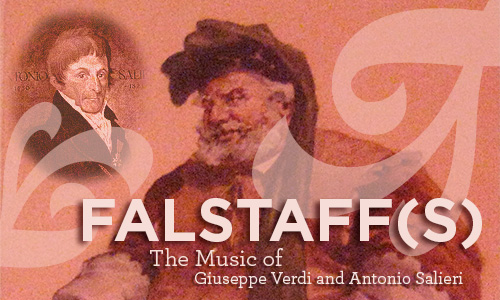-
FALSTAFF(S)
By Kiersten HayPosted in FalstaffBy C. Ian Kyer

In 1995 when American bass-baritone John Del Carlo was preparing to sing the lead in Falstaff at the Schwetzinger Festspiele, he had to do extra training. He had sung Verdi’s Falstaff before but this time was very different, because what he was singing was not the work of Arrigo Boito and Giuseppe Verdi. This Falstaff featured a libretto by Carlo Prospers Defranceschi with music by none other than Mozart’s infamous rival, Antonio Salieri. To Del Carlo’s surprise he found the work both entertaining and musically interesting.
The two Falstaffs were both the work of mature and celebrated composers. Verdi’s Falstaff was in fact his 26th and last opera. He had said that he fired his last cartridge with Otello (1887) but in 1889, at age 76, he began to set another libretto based on Shakespeare’s The Merry Wives of Windsor. Verdi and his librettist called it Falstaff, after the lead character in Shakespeare’s play, Sir John Falstaff, and it premiered at Milan’s Teatro alla Scala on February 9, 1893.
Coincidentally, the first opera ever performed at La Scala had been Antonio Salieri’s Europa Riconosciuta in 1778 (it was also performed at the re-opening in 2004), when Salieri was only 28 years old. He was much older in 1799 when he wrote the music for Falstaff, his 37th opera, but certainly not as old as Verdi was when he composed his version. One of Salieri’s students, Ludwig van Beethoven, so liked the work (or so wished to exploit its popularity) that he did piano variations on a duet from the opera, La stessa, la stessissima.
This year the Dell’Arte Opera Ensemble of New York marked Antonio Salieri’s birthday (August 18th) by presenting his Falstaff as part of the company’s two-week A Summer of Shakespeare festival. See the New York Times review here.
You owe it to yourself to attend the COC’s performance of the Verdi comedic masterpiece, but you should also watch John Del Carlo sing Salieri’s Falstaff from the Schwetzinger Festspiele. It was recorded and released on DVD (and a trailer for it can be found on YouTube here). For a classic DVD version of Verdi’s version, check out Franco Zeffirelli’s acclaimed Metropolitan Opera production conducted with warmth and brio by James Levine. Its superb ensemble cast features Paul Plishka in the title role; Mirella Freni as a delightful Alice and, early in their careers, Susan Graham and Barbara Bonney as Meg and Nannetta. Marilyn Horne takes a comic turn as Mistress Quickly. The DVD is available for purchase at the Opera Shop for $25.75 including tax. Watching these two operas will give you a real insight into how the art form has changed in the almost 100 years between them.
For more information about the Austrian Imperial Kapellmeister Salieri, read Ian Kyer’s novel “Damaging Winds” (available for free online in both PDF and ePUB file formats) or listen to him as a guest on the National Arts Centre podcasts.
Image Credits: Portrait of Antonio Salieri, Museo Fiorini, Legnago. Wiki Commons. Costume design realized on commission of Ricordi & c. by Adolf Hohenstein for the premiere at the Teatro alla Scala, February 9, Milan, Wiki Commons.
_20240704163452_0.png)